-
12-08-2023
A relação entre o nível de conhecimento e o comportamento de prevenção do corrimento vaginal para estudantes de enfermagem
Revista Brasileira de Enfermagem. 2023;76:e20220602
Abstract
A relação entre o nível de conhecimento e o comportamento de prevenção do corrimento vaginal para estudantes de enfermagem
Revista Brasileira de Enfermagem. 2023;76:e20220602
DOI 10.1590/0034-7167-2022-0602
Views0See moreRESUMEN
Objetivo:
la salud reproductiva de las adolescentes es muy importante. Determinar la relación entre el nivel de conocimientos y la conducta de prevención del flujo vaginal en estudiantes de enfermería.
Métodos:
estudio cuantitativo, transversal, con 155 estudiantes de primer año de una facultad privada de enfermería. Los datos se recopilaron de febrero a marzo de 2022 a través de un cuestionario electrónico.
Resultados:
los participantes con buen nivel de conocimientos correspondieron al 98,1% y los que practican buenas conductas para prevenir el flujo vaginal, el 92,3%.
Conclusión:
un buen conocimiento produce conductas de prevención adecuadas. El resultado de este estudio puede contribuir con reflexiones y referencias para un estudio más profundo de los factores que influyen en el nivel de conocimiento y comportamiento sobre la enfermedad de los genitales y los peligros del flujo vaginal patológico.
-
ORIGINAL ARTICLE12-08-2023
Social support networks and life cycle stage of Venezuelan immigrant families
Revista Brasileira de Enfermagem. 2023;76:e20220790
Abstract
ORIGINAL ARTICLESocial support networks and life cycle stage of Venezuelan immigrant families
Revista Brasileira de Enfermagem. 2023;76:e20220790
DOI 10.1590/0034-7167-2022-0790
Views0See moreABSTRACT
Objective:
To understand the structures of social networks of interiorized Venezuelan immigrant families and the life cycle stage they are in.
Methods:
Qualitative multiple-case study with families from the Interiorization Program residing in the Greater Florianópolis, Brazil. Screening occurred through social networks and key informants. For data collection, the photovoice technique and semi-structured interviews were used, categorized with the help of the Atlas.ti software. Genograms and ecomaps were elaborated.
Results:
Of the 4 families interviewed, totaling 7 members with young children, the nuclear family was identified as the main informal support network. Formal networks included schools, churches, and civil society.
Conclusion:
Families rely heavily on their nuclear structure for support, with formal institutions acting as secondary resources. The predominant life cycle stage is focused on families with young children. More efforts are needed to strengthen formal support networks.
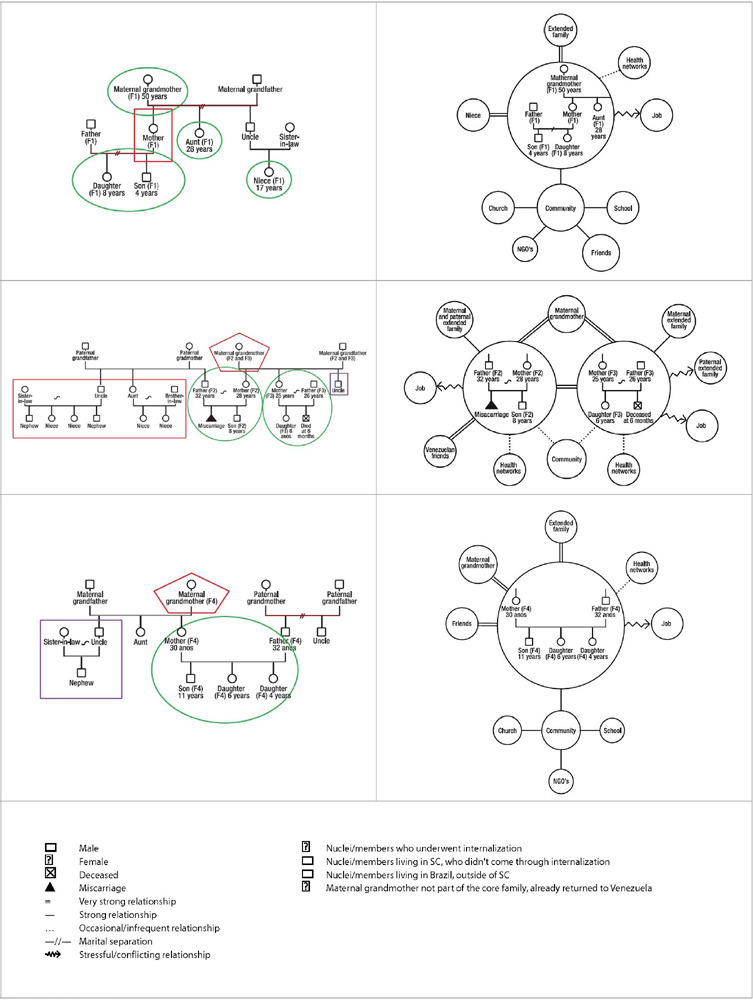
-
ORIGINAL ARTICLE12-08-2023
Factors associated with surgical site infection in myocardial revascularization: a retrospective longitudinal study
Revista Brasileira de Enfermagem. 2023;76:e20230108
Abstract
ORIGINAL ARTICLEFactors associated with surgical site infection in myocardial revascularization: a retrospective longitudinal study
Revista Brasileira de Enfermagem. 2023;76:e20230108
DOI 10.1590/0034-7167-2023-0108
Views0See moreABSTRACT
Objectives:
to analyze the influence of sociodemographic and clinical variables, as well as the surgical checklist adherence score, on the occurrence of surgical site infection among patients undergoing myocardial revascularization.
Methods:
an observational, longitudinal, retrospective study was conducted at a university hospital, involving 266 medical records of patients who underwent myocardial revascularization surgery. Instruments containing sociodemographic, clinical, and infection-related variables were used, along with the Perioperative Surgical Safety Checklist. Descriptive, bivariate, and logistic regression analyses were employed.
Results:
surgical site infection occurred in 89 (33.5%) patients. There was a statistically significant association between body temperature outside the range of 36 degrees Celsius to 36.5 degrees Celsius (p=0.01), the presence of invasive devices (p=0.05), surgical procedures with the anticipation of critical events (p<0.001), and the occurrence of infection.
Conclusions:
body temperature, the presence of invasive devices, and surgical procedures with the anticipation of critical events were significant factors contributing to an increased risk of infection.
-
ORIGINAL ARTICLE12-08-2023
Knowledge and practices about health among Quilombola men: contributions to health care
Revista Brasileira de Enfermagem. 2023;76:e20230138
Abstract
ORIGINAL ARTICLEKnowledge and practices about health among Quilombola men: contributions to health care
Revista Brasileira de Enfermagem. 2023;76:e20230138
DOI 10.1590/0034-7167-2023-0138
Views1See moreABSTRACT
Objective:
to analyze health knowledge and practices among Quilombola men.
Methods:
a qualitative, descriptive study, carried out with 40 men from two Quilombola communities in Santa Izabel do Pará, state of Pará, Brazil. Individual interviews were carried out using a semi-structured script. Text corpus was subjected to analysis with Interface de R pour les Analyses Multidimensionnelles de Textes et de Questionnaires 0.6, alpha 3, through Descending Hierarchical Classification.
Results:
among participants, eight (20.00%) were aged 55 to 59 years. 382 text segments were identified, with 299 (78.27%) being used, generating five lexical classes, which made up two subcorpora. The classes were organized into four thematic axes, covering knowledge about health and practices to prevent and solve health problems.
Final considerations:
men highlighted popular/traditional wisdom permeated by biomedical knowledge, translating their understanding of how to act to remain or become healthy.

-
12-08-2023
Influência da deambulação precoce combinada a terapia dhikr no peristaltismo intestinal de pacientes submetidos a colecistectomia aberta
Revista Brasileira de Enfermagem. 2023;76:e20220636
Abstract
Influência da deambulação precoce combinada a terapia dhikr no peristaltismo intestinal de pacientes submetidos a colecistectomia aberta
Revista Brasileira de Enfermagem. 2023;76:e20220636
DOI 10.1590/0034-7167-2022-0636
Views0See moreRESUMEN
Objetivos:
analizar y determinar el efecto de una intervención que combinó la deambulación temprana y la terapia dhikr sobre la recuperación peristáltica intestinal de pacientes sometidos a colecistectomía abierta.
Métodos:
se utilizó un diseño preexperimental con un grupo pretest y postest. Las muestras incluyeron 15 pacientes sometidos a colecistectomía abierta y seleccionados mediante muestreo intencional. Los datos se recopilaron por medio de fichas de observación del instrumento y se analizaron mediante la prueba de Wilcoxon. La deambulación temprana utilizó el procedimiento operativo estándar en el hospital y la terapia dhikr se realizó durante 10 a 15 minutos, dos horas después de la operación.
Resultados:
la deambulación temprana asociada con la terapia dhikr afectó la recuperación peristáltica intestinal de los pacientes que se sometieron a colecistectomía abierta con anestesia general (Z =-3,442; p=0,001).
Conclusiones:
la combinación de la deambulación temprana con la terapia dhikr puede recomendarse como una intervención para mejorar el movimiento peristáltico intestinal de los pacientes después de una colecistectomía abierta con anestesia general.
-
REVIEW12-08-2023
Educational technologies for accident prevention due to falls in childhood: a scoping review
Revista Brasileira de Enfermagem. 2023;76:e20220807
Abstract
REVIEWEducational technologies for accident prevention due to falls in childhood: a scoping review
Revista Brasileira de Enfermagem. 2023;76:e20220807
DOI 10.1590/0034-7167-2022-0807
Views2See moreABSTRACT
Objectives:
to map evidence on educational technology use for accident prevention due to falls in childhood.
Methods:
a scoping review, carried out in October and November 2022, in the MEDLINE, Web of Science, BDENF and CINAHL databases and LILACS bibliographic index. There was no delimitation of language or time. Data were extracted and analyzed descriptively by two independent researchers. The research protocol was registered in the Open Science Framework.
Results:
twenty-six studies were selected. Booklets, pamphlets and leaflets were the most used technologies, presenting health services as the most frequent environment to develop research on fall prevention. The technologies developed were important outcomes: increased knowledge of children, family members, caregivers, health and education professionals.
Conclusions:
educational technology use makes it possible to increase knowledge, adopt safe practices and reduce falls.

-
ORIGINAL ARTICLE12-08-2023
Construction and validity of educational technology about the human papillomavirus vaccine for adolescents
Revista Brasileira de Enfermagem. 2023;76:e20230048
Abstract
ORIGINAL ARTICLEConstruction and validity of educational technology about the human papillomavirus vaccine for adolescents
Revista Brasileira de Enfermagem. 2023;76:e20230048
DOI 10.1590/0034-7167-2023-0048
Views1See moreABSTRACT
Objectives:
to construct and validate an educational technology in comic book format about the human papillomavirus vaccine aimed at adolescents.
Methods:
a methodological study, with a quantitative approach, through the agreement method. It was carried out in two phases: educational technology construction and content validity. Participants are expert judges in the health field. Data collection took place in a virtual environment, through a questionnaire. Data analysis was performed by calculating the Content Validity Index. A Content Validity Index of at least 80% was accepted.
Results:
the comic book’s overall Content Validity Index was 82%, reaching the minimum limit established to be validated.
Conclusions:
comics are fundamental in the teaching-learning process, aiming to catch adolescents’ attention. Therefore, it is characterized as a valid tool to inform, in a playful manner, about the human papillomavirus vaccine.

-
ORIGINAL ARTICLE12-08-2023
Sociodemographic factors associated with suicidal behavior at a federal public university in the Western Brazilian Amazon
Revista Brasileira de Enfermagem. 2023;76:e20230102
Abstract
ORIGINAL ARTICLESociodemographic factors associated with suicidal behavior at a federal public university in the Western Brazilian Amazon
Revista Brasileira de Enfermagem. 2023;76:e20230102
DOI 10.1590/0034-7167-2023-0102
Views0See moreABSTRACT
Objective:
to determine risk factors for suicidal behavior among students and employees of a federal public university in the Brazilian Western Amazon.
Methods:
an analytical cross-sectional study of survey and association between variables with a sample of 475 participants. Statistical analyzes were performed using the Mann-Whitney test, Pearson’s chi-square test, likelihood ratio test or Fisher’s exact test and a logistic regression model. A significance level of 5% was used (p-value< 0.05).
Results:
a higher proportion of suicidal behavior was found in younger participants, females, who had no religion or had one, but were non-practicing, who did not have children and/or had a monthly family income of less than two minimum wages. Lower proportions of suicidal behavior were identified in heterosexuals and/or married or in a stable relationship.
Conclusion:
the study suggests a relationship between sociodemographic factors and suicidal behavior in the studied academic community.
-
ORIGINAL ARTICLE08-08-2022
Social and territorial inequalities in the mortality of children and adolescents due to COVID-19 in Brazil
Revista Brasileira de Enfermagem. 2022;75(6):e20210482
Abstract
ORIGINAL ARTICLESocial and territorial inequalities in the mortality of children and adolescents due to COVID-19 in Brazil
Revista Brasileira de Enfermagem. 2022;75(6):e20210482
DOI 10.1590/0034-7167-2021-0482
Views0See moreABSTRACT
Objective:
To analyze the mortality rate of COVID-19 among children and adolescents aged 0 to 14 years.
Methods:
Ecological and exploratory study of children’s mortality rate by COVID-19 in Brazil, from February to October 2020. The study used the Severe Acute Respiratory Syndrome database to collect the data and made the analysis using descriptive spatial statistics by age and race/color classification.
Result:
The mortality rate due to COVID-19 represented 1.34 deaths per one hundred thousand in the total group evaluated. The age group with the highest frequency and mortality rate was 1 to 4 years of age. There is a higher frequency of deaths in the brown and Indigenous population.
Conclusion:
The distribution of deaths due to COVID-19 is unequal in the national territory, and there is a wide variation in the mortality rate by age and race/color groups.

-
ORIGINAL ARTICLE12-08-2023
Construction and validity of educational technology about the human papillomavirus vaccine for adolescents
Revista Brasileira de Enfermagem. 2023;76:e20230048
Abstract
ORIGINAL ARTICLEConstruction and validity of educational technology about the human papillomavirus vaccine for adolescents
Revista Brasileira de Enfermagem. 2023;76:e20230048
DOI 10.1590/0034-7167-2023-0048
Views1See moreABSTRACT
Objectives:
to construct and validate an educational technology in comic book format about the human papillomavirus vaccine aimed at adolescents.
Methods:
a methodological study, with a quantitative approach, through the agreement method. It was carried out in two phases: educational technology construction and content validity. Participants are expert judges in the health field. Data collection took place in a virtual environment, through a questionnaire. Data analysis was performed by calculating the Content Validity Index. A Content Validity Index of at least 80% was accepted.
Results:
the comic book’s overall Content Validity Index was 82%, reaching the minimum limit established to be validated.
Conclusions:
comics are fundamental in the teaching-learning process, aiming to catch adolescents’ attention. Therefore, it is characterized as a valid tool to inform, in a playful manner, about the human papillomavirus vaccine.

-
ERRATUM02-26-2024
ERRATUM
Revista Brasileira de Enfermagem. 2024;77(1):e20160061
Abstract
ERRATUMERRATUM
Revista Brasileira de Enfermagem. 2024;77(1):e20160061
DOI 10.1590/0034-7167.20247701e03
Views2In the article “Nurses in the labor market: professional insertion, competencies and skills”, with DOI number: , published in Revista Brasileira de Enfermagem, 2017;70(6):1220-6, on page 1225:Include before REFERENCES:[…]See more -
ORIGINAL ARTICLE01-10-2024
Nursing care management strategies to address the COVID-19 pandemic
Revista Brasileira de Enfermagem. 2024;77:e20230254
Abstract
ORIGINAL ARTICLENursing care management strategies to address the COVID-19 pandemic
Revista Brasileira de Enfermagem. 2024;77:e20230254
DOI 10.1590/0034-7167-20230254
Views1See moreABSTRACT
Objective:
To characterize nursing care management strategies for addressing the COVID-19 pandemic.
Method:
A descriptive, qualitative study conducted with 22 nurse professionals at a University Hospital in Southern Brazil. Data collection through interviews in June and August 2021, analyzed according to Bardin’s Content Analysis and the theoretical framework of complex thinking.
Results:
The identified strategies were organized into four categories: Reorganization of health services; People management and emergency admission; Multiprofessional articulation; and Bedside nursing care.
Final Considerations:
Professional performance revealed a complex interplay between leadership and care management practices, even in the face of working condition restrictions, and were understood as crucial in the pandemic scenario.
-
REVIEW01-10-2024
Prevalence and exposure variables of latent infection by mycobacterium tuberculosis in healthcare workers
Revista Brasileira de Enfermagem. 2024;77:e20240052
Abstract
REVIEWPrevalence and exposure variables of latent infection by mycobacterium tuberculosis in healthcare workers
Revista Brasileira de Enfermagem. 2024;77:e20240052
DOI 10.1590/0034-7167-2024-0052
Views1See moreABSTRACT
Objectives:
To identify in the scientific literature the prevalence, diagnostic methods, and exposure variables of latent infection by Mycobacterium tuberculosis in healthcare workers.
Methods:
An integrative review of the scientific literature based on the following review question: What are the available scientific evidence in the literature that address the prevalence of latent infection by Mycobacterium tuberculosis in healthcare workers and its association with possible risk factors among these workers?
Results:
Being a physician or nurse, being older, and being male were generally associated with higher prevalences. The study also showed that interferon-gamma release assays were more commonly used as a diagnostic method compared to skin tests.
Conclusions:
More studies are needed regarding the epidemiology of latent infection by Mycobacterium tuberculosis in the context of healthcare workers, aiming for higher impact actions that contribute to the reduction of tuberculosis worldwide.

-
01-01-2016
Nursing care in Specialized HIV/Aids Outpatient Services
Revista Brasileira de Enfermagem. 2016;69(3):515-521
Abstract
Nursing care in Specialized HIV/Aids Outpatient Services
Revista Brasileira de Enfermagem. 2016;69(3):515-521
DOI 10.1590/0034-7167.2016690314i
Views1See moreABSTRACT
Objective:
to analyze the discourses about the care provided by nurses operating in Specialized HIV/Aids Outpatient Services in four public institutions of the city of Fortaleza, Ceará, Brazil.
Method:
descriptive and exploratory study with a qualitative approach, which used as a method the discourse analysis.
Results:
when titling the “care as negative”, such title came from the analogy proposed by Freud (1912) with the photographic negative, represented by what that care can configure from the unconscious movement, since nurses did not perceive themselves in the care actions developed by supporting the work of other occupational categories, contributing to maintain the ideology of biomedicine.
Conclusion:
it is necessary to justify and theorize a nursing clinical practice from epistemological issues of the profession, in such a way that nurses can understand their relevance within the care provided.
-
ORIGINAL ARTICLE04-16-2021
Practices used by a home care team: implications for caregivers
Revista Brasileira de Enfermagem. 2021;74(2):e20190794
Abstract
ORIGINAL ARTICLEPractices used by a home care team: implications for caregivers
Revista Brasileira de Enfermagem. 2021;74(2):e20190794
DOI 10.1590/0034-7167-2019-0794
Views0See moreABSTRACT
Objectives:
to analyze the practices of a home care team and their implications for caregivers’ performance.
Methods:
qualitative study with data obtained from observation of 21 users, 30 caregivers and 6 professionals from the home health care service in a municipality in Minas Gerais, from February to June 2018. The material was analyzed from the perspective of discourse analysis according to Michel Foucault.
Results:
team interference upon caregivers is exercised by disciplinary practices and prescriptive, authoritative and surveilling behaviors. The team’s knowledge-power relationship determines caregivers’ acceptance through convincing or through difficulty of understanding assigned orientations. Educational practices would enable caregivers to be constituted as active, participative, empowered and reflective subjects.
Final Considerations:
team practices interfere with caregivers’ ways of acting and being and they have implications in objectification and subjectification processes.
-
08-16-2021
Pregnant women’s contribution in the construction and evaluation of an educational technology: the “Comics for Pregnant Women”
Revista Brasileira de Enfermagem. 2021;74:e20201243
Abstract
Pregnant women’s contribution in the construction and evaluation of an educational technology: the “Comics for Pregnant Women”
Revista Brasileira de Enfermagem. 2021;74:e20201243
DOI 10.1590/0034-7167-2020-1243
Views1See moreABSTRACT
Objectives:
to describe the contribution of pregnant women to the construction and evaluation of educational technology.
Methods:
a participatory study developed in three stages, which occurred between March 2018 and June 2019 for identifying the content, construction, and evaluation of the comic. Non-directive interviews were conducted in educational groups with 34 pregnant women. After the comic was built by a team, including a designer, an instrument was applied to 41 pregnant women to evaluate the items Objectives, Organization, Writing style, Appearance, and Motivation.
Results:
the comic contains 40 pages of contents, illustrations, and quizzes (word search, cross-puzzle, seven mistakes, etc). The pregnant women evaluated it as easy to understand, self-explanatory, aesthetically attractive, and capable of motivating good care practices during pregnancy, obtaining a minimum agreement of 92.1%.
Final Considerations:
the innovation of the educational technology consisted of incorporating the voices of pregnant women in prenatal care, with the potential to stimulate reflections and the learning process of this target audience.

-
08-19-2019
Humor intervention in the nurse-patient interaction
Revista Brasileira de Enfermagem. 2019;72(4):1078-1085
Abstract
Humor intervention in the nurse-patient interaction
Revista Brasileira de Enfermagem. 2019;72(4):1078-1085
DOI 10.1590/0034-7167-2018-0609
Views0ABSTRACT
Objective:
To describe the factors influencing the use of humor in nursing care, its applicability and benefits.
Method:
A scoping review was performed using the Arksey and O’Mally methodology. A search for articles published between 2008 and 2018 was performed using the platforms EBSCO Host, Virtual Health Library and Google Scholar.
Results:
From the initial 465 articles found, 17 were included for final revision. Data allowed to retrieve information on humor definition; its applicability as a nursing intervention; humor as a tool to improve nurse-patient communication and relationship; influence factors; type of humor interventions; humor benefits in health care context and; limitations and precautions of humor intervention.
Conclusion:
The use of humor promotes both communication and human interaction; it promotes well-being; helps deal/cope with difficult and unpleasant situations, reduces tension, discomfort and stress; and strengthens the immune system. This intervention should be used with caution.
Keywords:CommunicationNurse-Patient RelationsNursingPatient Outcome AssessmentWit and Humor as SubjectSee more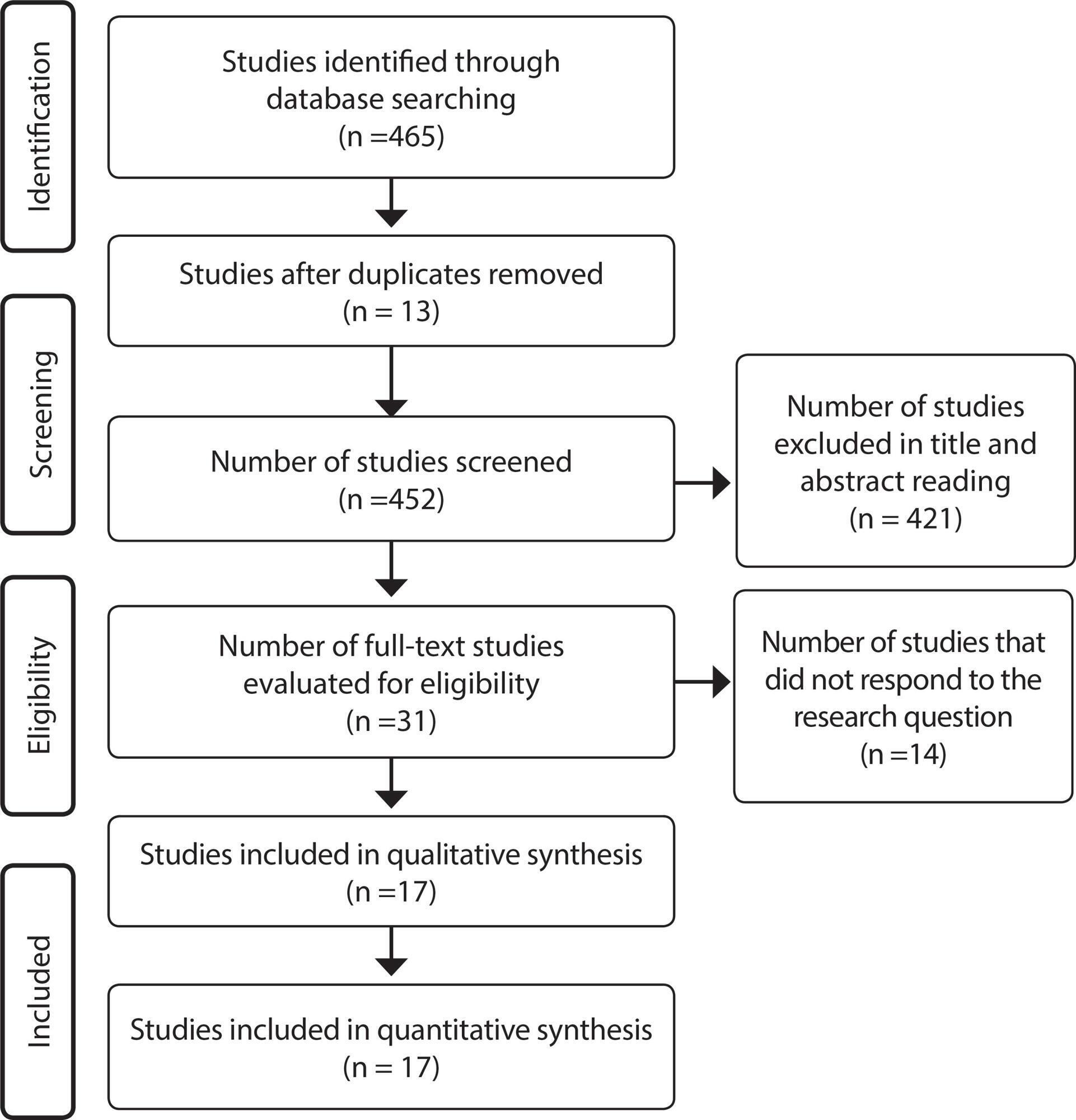
-
ORIGINAL ARTICLE10-21-2019
Workloads and burnout of nursing workers
Revista Brasileira de Enfermagem. 2019;72(6):1435-1441
Abstract
ORIGINAL ARTICLEWorkloads and burnout of nursing workers
Revista Brasileira de Enfermagem. 2019;72(6):1435-1441
DOI 10.1590/0034-7167-2017-0659
Views0See moreABSTRACT
Objective:
to identify workloads in nursing work and its association with nursing worker burnout.
Method:
a cross-sectional study, including 211 nursing workers from a university hospital, between July and August 2016. For the analysis, the descriptive statistics, Chi-Square Test, Fisher’s Exact Test and Mann Whitney U-Test were used.
Results:
the most evidenced loads were biological. A significant association was found between workloads and workers’ occupation, as well as a significant association between workloads and worker burnout. Burnout caused upper limb pain, neck and lumbar pain, lower limb pain, muscle spasm, lower limb edema, mental fatigue, headache, nervousness, and forgetfulness.
Conclusion:
workloads identification is a subsidy for the promotion of interventions that minimize the burnout generated to the health of the nursing worker.
-
REVIEW12-05-2019
Vulnerability of the elderly: a conceptual analysis
Revista Brasileira de Enfermagem. 2019;72:337-344
Abstract
REVIEWVulnerability of the elderly: a conceptual analysis
Revista Brasileira de Enfermagem. 2019;72:337-344
DOI 10.1590/0034-7167-2018-0728
Views0See moreABSTRACT
Objective:
To analyze the concept of vulnerability of the elderly.
Method:
A concept analysis, according to the method proposed by Walker and Avant, operationalized through integrative review through search in scientific data portals using the
Descriptors:
Health vulnerability, aged, health services for the aged, health of the elderly, vulnerable populations and geriatric health services. To compose the literary corpus, 36 studies were selected.
Results:
Concept antecedents, as well as its attributes, were identified in individual, social and programmatic characteristics, which make up the characteristics of “vulnerability of the elderly”, besides consequences of the phenomenon. These characteristics were analyzed with emphasis on aspects that contribute to the process of vulnerability of the elderly.
Conclusion:
The study demonstrated the multidimensionality of the phenomena studied, highlighting the peculiarities of vulnerability during aging. However, there is a need for further studies on the construct.
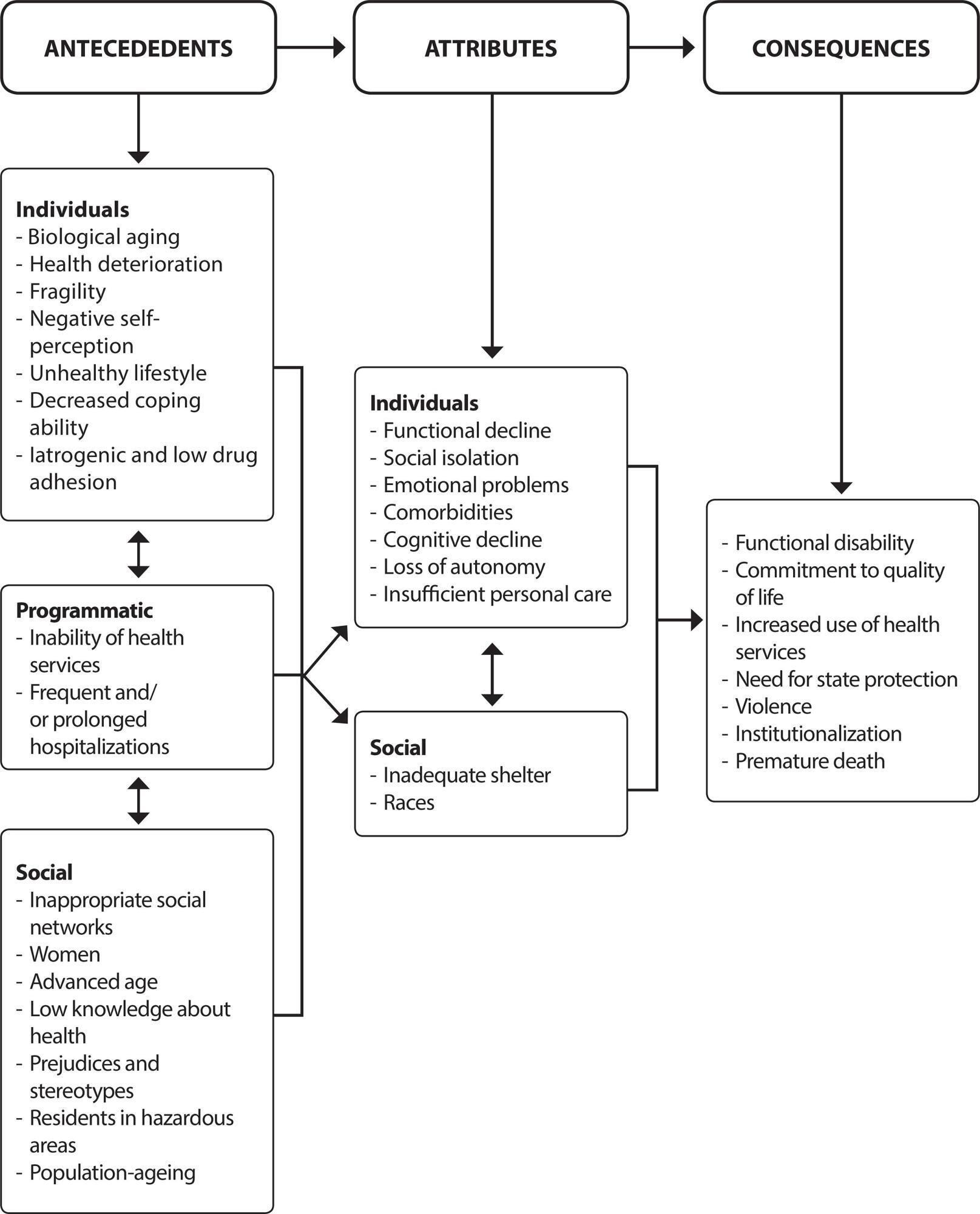
-
ORIGINAL ARTICLE07-13-2020
Incontinence-associated dermatitis in elderly patients: prevalence and risk factors
Revista Brasileira de Enfermagem. 2020;73:e20180475
Abstract
ORIGINAL ARTICLEIncontinence-associated dermatitis in elderly patients: prevalence and risk factors
Revista Brasileira de Enfermagem. 2020;73:e20180475
DOI 10.1590/0034-7167-2018-0475
Views0See moreABSTRACT
Objective:
To determine the prevalence and risk factors for incontinence-associated dermatitis in the elderly.
Method:
Cross-sectional exploratory study carried out in public hospitals. The dermatitis prevalence and associations were obtained by calculating the ratio. The effect dimension was estimated by the odds ratio with a 95% confidence interval and statistical significance p <0.05.
Results:
138 elderly people were included, with an average age of 77.2 years old (± 9.3); 69 (50%) had combined fecal and urinary incontinence. The dermatitis prevalence was 36.2% (50); 28% (14) had pressure injuries; 14% (7), candidiasis. Risk factors were: longer hospital stay (Odds Ratio = 5.8 [2.6-12.9]), obesity (Odds Ratio = 3.6 [1.2-10.4]), high level of dependence (Odds Ratio = 2.4 [1,1-5,0]) and high risk for pressure injury (Odds Ratio = 6.1 [1,4-26,9]).
Conclusion:
The study found a high prevalence of dermatitis associated with incontinence. The early recognition of risk factors favors effective preventive actions.
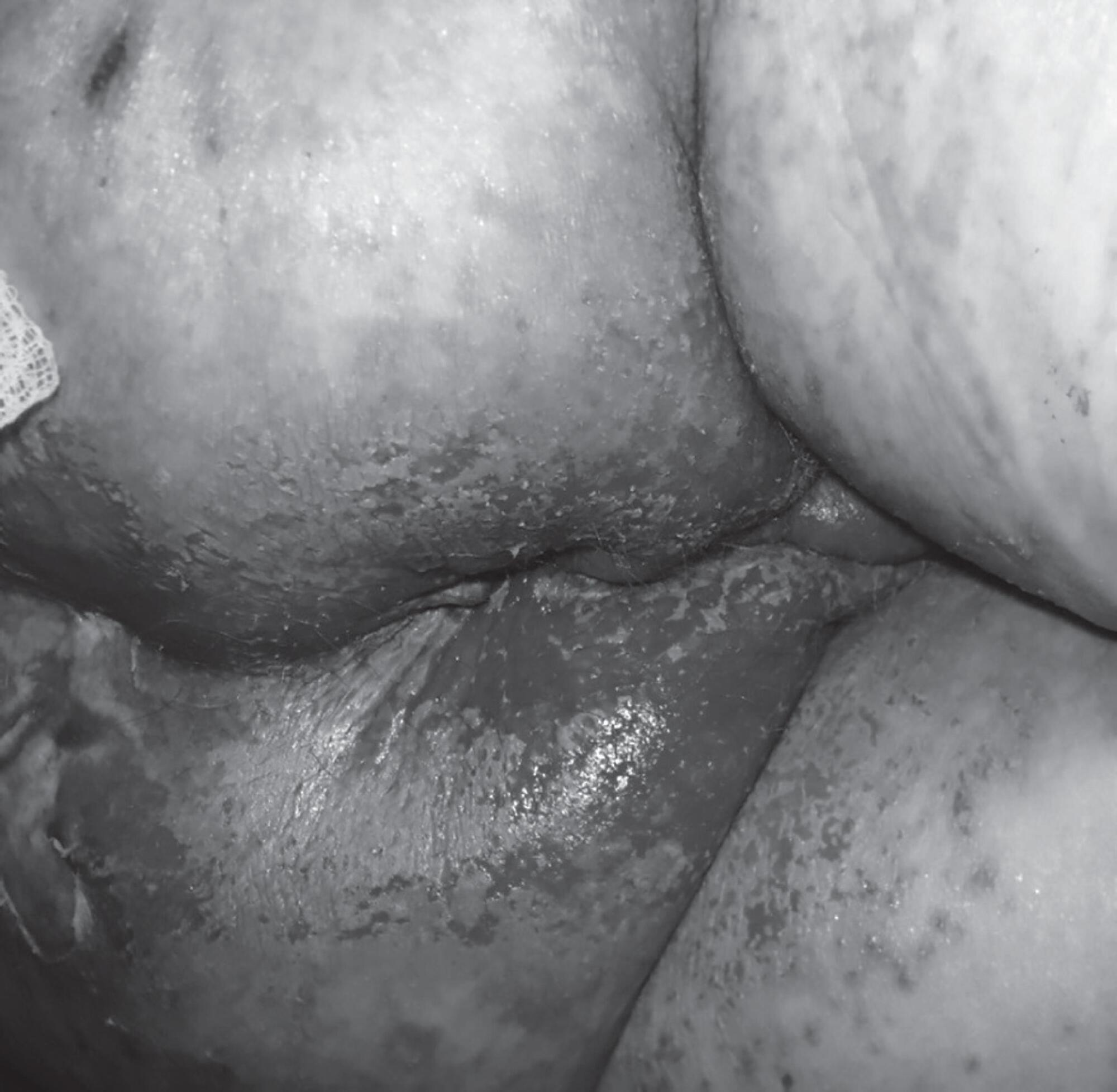
-
08-19-2019
Clinical simulation in nursing education in intensive therapy: an integrative review
Revista Brasileira de Enfermagem. 2019;72(4):1061-1070
Abstract
Clinical simulation in nursing education in intensive therapy: an integrative review
Revista Brasileira de Enfermagem. 2019;72(4):1061-1070
DOI 10.1590/0034-7167-2018-0217
Views0See moreABSTRACT
Objective:
to analyze the publications on clinical simulation practices for education in Nursing in Intensive Care.
Method:
an integrative review carried out through LILACS, PubMed, Cochrane Library, CINAHL and SciELO databases, of articles published from 2008 to 2017.
Results:
29 articles were selected, of which 76% discuss the use of simulation in continuing education of nursing professionals, while the others describe their use for student education. There is a higher prevalence of studies with a level of evidence 6 (17), with 28 international publications. There was an increase in scientific production, with 16 articles published in the last three years.
Conclusion:
variables after simulation use, such as confidence, communication skills, efficiency in the identification of clinical worsening of patients, development of technical skills, teamwork and clinical decision-making, presented a significant improvement, demonstrating that this tool is effective in qualifying care for critical patients.
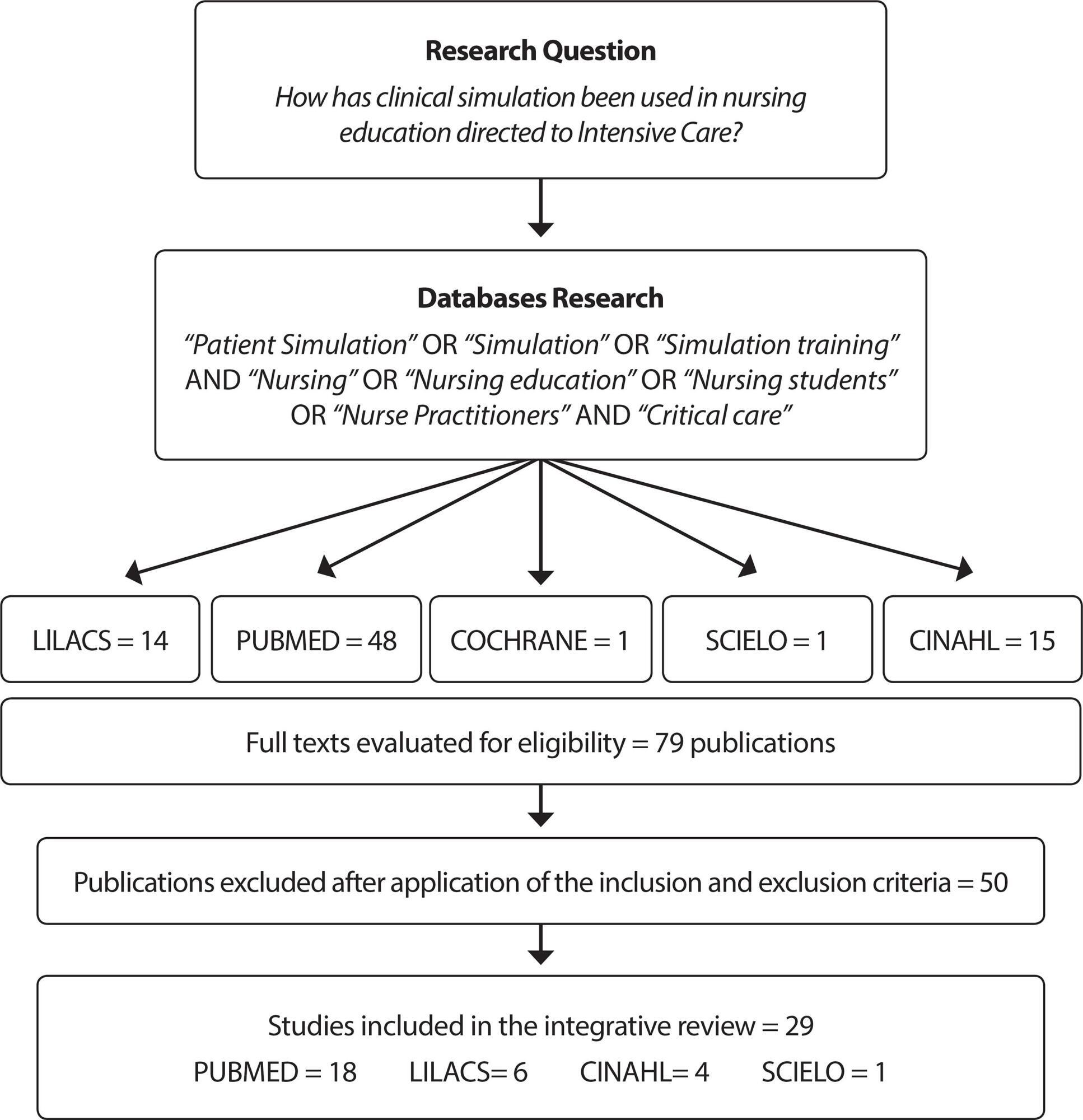
-
01-20-2021
Burnout Syndrome and Associated Factors in Intensive Care Unit Nurses
Revista Brasileira de Enfermagem. 2021;74:e20190535
Abstract
Burnout Syndrome and Associated Factors in Intensive Care Unit Nurses
Revista Brasileira de Enfermagem. 2021;74:e20190535
DOI 10.1590/0034-7167-2019-0535
Views0See moreABSTRACT
Objective:
to estimate prevalence and factors associated with Burnout Syndrome in intensive care nurses in a city in the state of Bahia.
Methods:
a cross-sectional, population-based study carried out with 65 intensive care nurses through a self-administered questionnaire, from July to November 2016, containing sociodemographic data, lifestyle, work characteristics. To define burnout syndrome, the Maslach Burnout Inventory was used.
Results:
Burnout Syndrome prevalence was 53.6%, an association was observed with age, tobacco consumption, alcohol use, weekly night shift hours, employment relationship, having an intensive care specialist title, number of patients on duty, monthly income and considering active or high-strain job.
Conclusion:
the results of this study can contribute to expanding the discussion on stressful working conditions in Intensive Care Units.
-
ORIGINAL ARTICLE12-05-2019
Elderly caregivers of the elderly: frailty, loneliness and depressive symptoms
Revista Brasileira de Enfermagem. 2019;72:88-96
Abstract
ORIGINAL ARTICLEElderly caregivers of the elderly: frailty, loneliness and depressive symptoms
Revista Brasileira de Enfermagem. 2019;72:88-96
DOI 10.1590/0034-7167-2018-0137
Views0See moreABSTRACT
Objective:
to investigate the association between frailty, loneliness and depressive symptoms of elderly caregivers.
Method:
a cross – sectional study carried out with 341 elderly caregivers enrolled in Family Health Units of a city in the countryside of São Paulo State. The interviews were domiciliary and included questionnaire for characterization of the caregiver, Fried’s frailty phenotype, family APGAR (family functionality), Geriatric Depression Scale (depressive symptoms) and item 3 of the Herth Hope Scale (loneliness). Logistic regression was used to analyze the association between depressive symptoms and solitude (independent variables), and frailty and pre-frailty (dependent variables).
Results:
there was an association between frailty, loneliness and depressive symptoms. Elderly caregivers had increased odds of 158% presenting pre-frailty, and 360% of frailty. Elderly caregivers with depressive symptoms had an increased chance of 242% of presenting fragility.
Conclusion:
elderly and lonely caregivers with depressive symptoms are more likely to be frail and pre-frail.
-
ORIGINAL ARTICLE06-08-2020
Usability of a mobile application on diabetic foot self-care
Revista Brasileira de Enfermagem. 2020;73(4):e20180862
Abstract
ORIGINAL ARTICLEUsability of a mobile application on diabetic foot self-care
Revista Brasileira de Enfermagem. 2020;73(4):e20180862
DOI 10.1590/0034-7167-2018-0862
Views0See moreABSTRACT
Objectives:
to assess the usability of an app prototype for diabetic foot self-care by an end user.
Methods:
a descriptive study that uses heuristic assessment of a hybrid app usability. Fifteen users of an outpatient diabetes care service in a capital of Northeastern Brazil participated in the study during April 2018. The usability measurement tool called Smartphone Usability questionnaiRE was applied.
Results:
the lowest score was 77 and the highest was 112, with an average usability of 96.1 points. Usability was framed in the last two levels, 70 and 8o. Users now strongly agree (level 70) and fully (level 80) with the assessed items, which represents good usability of the apps prototype.
Conclusions:
the final product developed focuses on user needs and requirements, which can ensure usability based on effectiveness, efficiency and satisfaction triad.
Search
Search in:
Nuvem de Tags
Adolescente (85) Atenção Primária à Saúde (239) COVID-19 (91) Criança (91) Cuidados de Enfermagem (269) Educação em Enfermagem (151) Educação em Saúde (139) Enfermagem (930) Enfermagem Pediátrica (86) Estudantes de Enfermagem (77) Estudos de Validação (131) Família (87) Idoso (208) Promoção da Saúde (99) Qualidade de Vida (104) Saúde do Trabalhador (86) Saúde Mental (145) Saúde Pública (82) Segurança do Paciente (150) Tecnologia Educacional (100)



